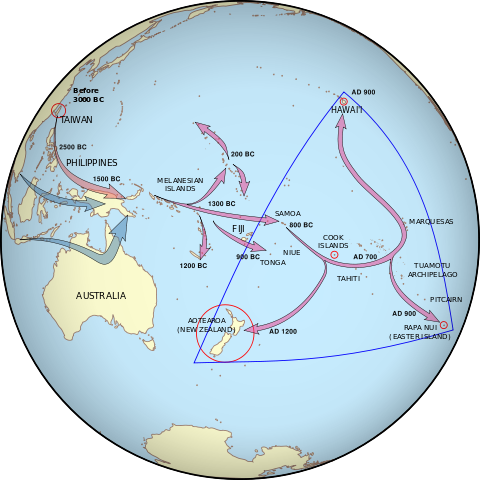 |
This is a file from the Wikimedia Commons. Information from its description page there is shown below.
Commons is a freely licensed media file repository. You can help.
|
Summary
| Description |
An equirectangular projection of Polynesia, created from the same data as File:Worldmap_wdb_combined.svg. Inkscape was used to add colour, clip the land, and add in migration arrows. |
| Date |
5 August 2008 |
| Source |
Own work. Migration arrows are supported by the following sources.
- From Taiwan through Melanesia to Polynesia, and earlier migration to Australia and New Guinea:
- Yoshan Moodley, Bodo Linz, Yoshio Yamaoka, Helen M. Windsor, Sebastien Breurec, Jeng-Yih Wu, Ayas Maady, Steffie Bernhöft, Jean-Michel Thiberge, Suparat Phuanukoonnon, Gangolf Jobb, Peter Siba, David Y. Graham, Barry J. Marshall, and Mark Achtman (2009). The Peopling of the Pacific from a Bacterial Perspective, Science 23 January 2009: 323 (5913), 527-530. doi: 10.1126/science.1166083
- Colonisation of East Polynesia, and dispersal to more remote islands (including Hawaii, Easter Island, and New Zealand):
- Janet M. Wilmshurst, Terry L. Hunt, Carl P. Lipo, and Atholl J. Anderson (2011). High-precision radiocarbon dating shows recent and rapid initial human colonization of East Polynesia, Proceedings of the National Academy of Sciences of the United States of America, February 1, 2011, vol. 108 no. 5, 1815-1820. doi: 10.1073/pnas.1015876108
|
| Author |
David Hall ( Gringer ( talk)) |
Permission
( Reusing this file) |
Please attribute this work to David Hall (gringer)
|
Licensing
I, the copyright holder of this work, hereby publish it under the following license:

 |
This file is licensed under the Creative Commons Attribution 3.0 Unported license. |
|
|
|
- You are free:
- to share – to copy, distribute and transmit the work
- to remix – to adapt the work
- Under the following conditions:
- attribution – You must attribute the work in the manner specified by the author or licensor (but not in any way that suggests that they endorse you or your use of the work).
http://creativecommons.org/licenses/by/3.0 CC-BY-3.0 Creative Commons Attribution 3.0 truetrue
|
|
File usage
The following pages on Schools Wikipedia link to this image (list may be incomplete):
This file contains additional information, probably added from the digital camera or scanner used to create or digitize it. If the file has been modified from its original state, some details may not fully reflect the modified file.
Wikipedia for Schools is designed to make learning fun and easy. SOS Children's Villages helps more than 2 million people across 133 countries around the world. There are many ways to help with SOS Children's Villages.


